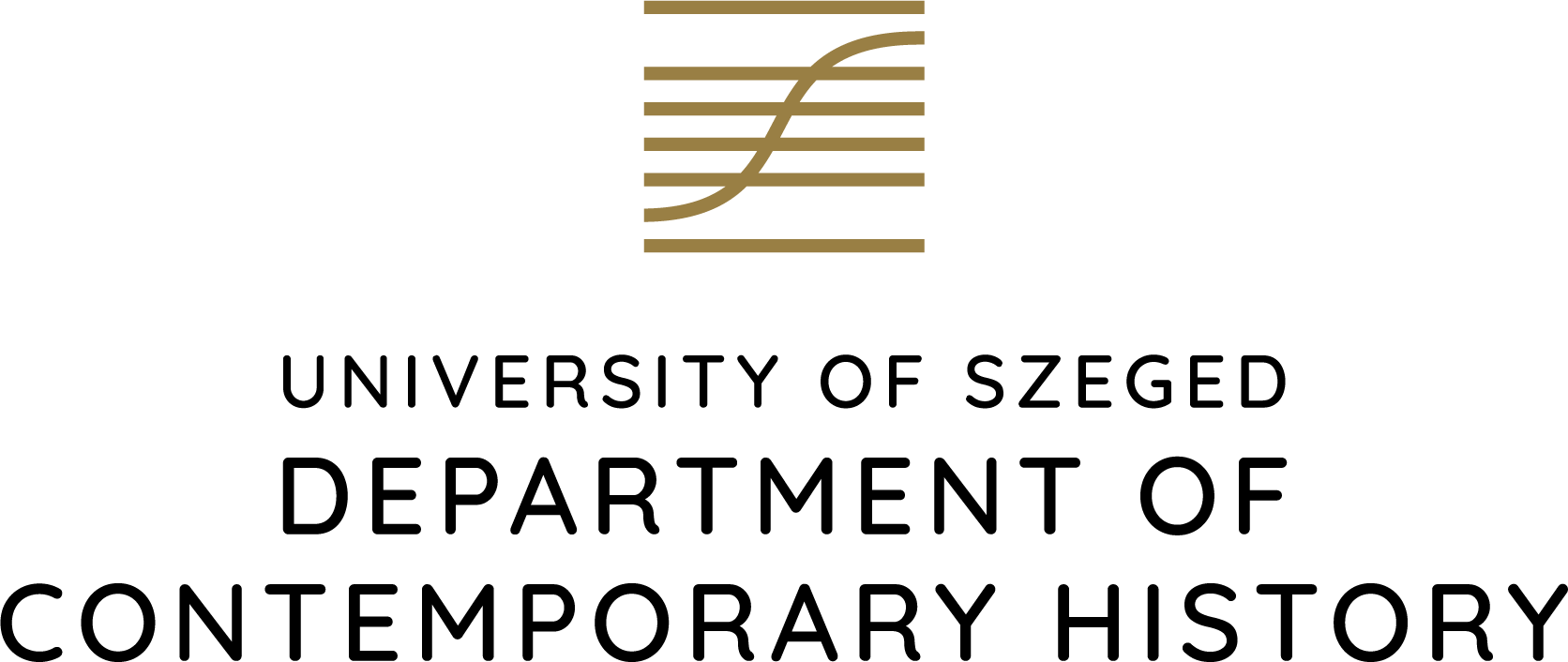

Prof. Dr. Béla Tomka
Leader of the research group
Head of the Department of Contemporary History
Fields of interest: 20th-century social and economic history, comparative history (thematic focuses include population and family in the 20th century, history of the welfare state, consumption history, history of globalization)
E-mail: tomka@hist.u-szeged.hu
Phone: (+36) 62-544-464
Office: Egyetem utca 2, Room 3223
Béla Tomka is professor at the Department of History, University of Szeged. He is the founder and head of the Department of Contemporary History and founding director of the Doctoral Programme of Contemporary and Comparative History at University of Szeged. His main research area is 20th-century social and economic history with a special emphasis on comparative perspectives.
Studies and Degrees
He earned a master’s degree in History and History of Eastern Europe at the University of Szeged, followed by postgraduate studies in economic and social history at the Corvinus University Budapest, in the United States (Minneapolis), and in Germany (Münster). He gained the dr. univ. degree in History in 1995, while a year later he received his PhD title in Economic and Social History. Tomka defended his habilitation thesis (‘venia legendi’) in 2004. In 2010 the Hungarian Academy of Sciences awarded him the Higher Doctorate (DSc) title.
Research
Within the social and economic history of 20th-century Hungary and Europe, his earlier research centred on changes of population and family patterns and the welfare state. His latest works has focused on the comparative history of economic growth, consumption and the quality of life in East Central Europe. His research interests also include the history of violence, propaganda, European integration and the history of globalization.
Professional Affiliations
Since 1992 he is co-editor of Aetas, a Quarterly Journal of History and Related Disciplines, while being a member of other editorial boards of academic periodicals as well (Esély, a Journal of Social Policy; The Hungarian Historical Review; Demográfia). In 2010 he was elected as board member of the International Social History Association (ISHA, Amsterdam) and since 2011 he has been the editor of the newsletter of this association. Since 2016 he has been acting as the President of the István Hajnal Society of Social History. He is also an external founding member of the Social and Economic History PhD program at Eötvös University (ELTE, Budapest).
Publications and Awards
He has been invited by several research institutes and universities in Europe and North-America as research fellow and visiting professor, including the International Institute of Social History, Amsterdam, Universität Mannheim, Freie Universität Berlin, Humboldt Universität zu Berlin, University of Oxford, University of Edinburgh, Portland State University (OR), Imre Kertesz Kolleg, Jena, Institut für Ost- und Südosteuropaforschung, Regensburg, and Univerzita Hradec Králové.
He is the author of 15 books and editor of several other volumes, as well as a number of scholarly articles. His major awards include the Bolyai Award for Outstanding Scholarly Contributions (2010) by the Bolyai Foundation Budapest, the Award of the Academy (for Distinguished Scholarly Achievement) endowed by the Hungarian Academy of Sciences in 2010, and Outstanding Academic Title 2013 Award by Choice, American Library Association (for A Social History of Twentieth-Century Europe, London and New York: Routledge, 2013).
Curriculum Vitae
Prof. Dr. Béla Tomka
Born 8 May 1962, Salgótarján, Hungary; Married, two children
Office Address: Department of Contemporary History, University of Szeged, Egyetem utca 2, Szeged H-6722, Hungary
Tel.: (+36) 62-544-806, fax: (+36) 62-544-464
E-mail: tomka@hist.u-szeged.hu
Positions Held / Academic Employment
2019–
Leader of the Interuniversity Research Group “History of Globalization” founded by the Hungarian Academy of Sciences
2014–
Head of Department, Department of Contemporary History, University of Szeged
2011–
Professor of Social and Economic History, Department of Contemporary History, University of Szeged
1999–2010
Associate Professor of Social and Economic History, Department of History, University of Szeged
1995–1999
Assistant Professor, Attila József University, Szeged
1989–1995
Assistant Lecturer, Attila József University, Szeged
1988–1989
Assistant Lecturer, Budapest University of Economics, Budapest
Education / Major Grants and Visiting Fellowships
2014
Institut für Ost- und Südosteuropaforschung, Regensburg, Visiting Fellow (3 months)
2012
Friedrich Schiller-Universität, Imre Kertész Kolleg, Jena, Visiting Fellow (12 months)
2010
“Second Doctorate” / “Higher Doctorate” (DSc), Hungarian Academy of Sciences
2010
Humboldt University, Berlin, Visiting Fellow (3 months)
2005
Portland State University, USA, Visiting Professor (3 months)
2004–2005
Institute for Advanced Studies in the Humanities, Edinburgh, Fellowship (3 months)
2006–2009
Bolyai Ösztöndíj, Magyar Tudományos Akadémia
2003
“Dr. habil.”-degree (Venia legendi), Debrecen University, Debrecen
2003–2007
Széchenyi Professorial Award (‘Junior Professor’), Ministry of Education, Republic of Hungary
2002
Oxford University, St. John’s College, Visiting Fellow (2 weeks)
2001–2002
Center for Comparative History of Europe, Freie Universität, Berlin, Humboldt Fellowship (12 months)
2000
International Institute of Social History, Amsterdam, Fellow (3 months)
2000
Mannheimer Zentrum für Europäische Sozialforschung, Mannheim, Visiting Fellow (2 months)
1997–2002
Széchenyi Professorial Award (‘Junior Professor’), Ministry of Education, Republic of Hungary
1996
Ph.D. in Economic and Social History, Kossuth University, Debrecen (summa cum laude)
1994
“Dr. univ.”-degree in History, Attila József University, Szeged (summa cum laude)
1992–1993
Postgraduate studies at University of Minnesota, Minneapolis, USA (10 months)
1990–1991
Postgraduate studies at Westfälische Wilhelms–Universität, Münster, Germany (10 months)
1988–1991
Doctoral studies in Economic and Social History, Budapest University of Economics (BKAE), Budapest
1988
M.A. in History and History of Eastern Europe, Attila József University, Szeged
Major Awards
2014
“Outstanding Academic Title 2013 Award” by CHOICE, American Library Association (for “A Social History of Twentieth-Century Europe”, London and New York: Routledge, 2013)
2010
Award of the Academy (for Distinguished Scholarly Achievement), Hungarian Academy of Sciences, Budapest
2010
Bolyai Award for Distinguished Scholarly Contribution, Bolyai Foundation, Budapest
Research Experience
Research projects in the field of 20th-century social and economic history of East Central Europe, with an emphasis on comparative and interdisciplinary approaches. Thematic focuses are social policy, demography and family, economic institutions and process of economic growth, consumption. Projects included
“Transfers of Institutions and Cultural Practices in 20th-Century Hungary”
“Social Policy in 20th-Century Hungary in an International Comparison,”
“Demographic Integration in 20th-Century Europe,”
“Family Development in Hungary in International Context, 1918–1990,”
“Hungarian Banking in International Comparison, 1850–1931,”
“Bank-Industry Relations in Hungary before the First World War”
Since 1991 Principal Investigator on 9 research grants funded by the OTKA (National Fund of Scientific Research), Budapest and OKTK (National Fund for Research in the Social Sciences), Budapest
Participation in international research projects, including “The European Social Model – On the Way to a Transnational Welfare State,” Wissenschaftszentrum zu Berlin (2003–2004); “A European Social Solidarity?” European University Institute, Florence (2006–2007); invited expert of the Council of Europe, Strasbourg, project “Shared Histories for a Europe without Dividing Lines” (2011), “Challenges of Modernity,” Book project, Imre Kertész Kolleg, Jena (2012–2016); “Living standard in East-Central Europe, 1913–2010”, Univerzita Hradec Králové (2018–2019)
Current Research / Work in Progress
“Transfers of Institutions and Cultural Practices in 20th-Century Hungary”
Teaching Experience
Undergraduate, graduate and doctoral courses in 20th century social and economic history; Doctoral supervision (Department of History and East-Central Europe International Studies Programme, University of Szeged, Szeged; Department of History, Eötvös University, Budapest; Department of Economics, Department of History, Portland State University, USA)
Editorial Experience
2017–
Demográfia, Review of Population Research, Budapest, Member of the Editorial Board
2012–
Hungarian Historical Review, Budapest, Board member
2011–
ISHA Newsletter (International Social History Association, Amsterdam), Editor
1994–
Esély, Journal of Social Policy, Budapest, Member of the Editorial Board
1992–
Aetas, a Quarterly Journal of History and Related Disciplines, Szeged, Co-Editor
Professional Service
2016–
Head of the Doctoral Programme Contemporary and Comparative History, University of Szeged
2003–
Member of Doctoral Council, Faculty of Arts, University of Szeged
2000–
Board Member of OTKA (National Fund of Scientific Research), Budapest
2000–
External Founding Member of the Doctoral (PhD) Programme in Social and Economic History, Eötvös University (ELTE), Budapest
1998–
Referee a. o. of OTKA (National Fund of Scientific Research), Budapest; Czech Science Fund, Prague; Institute for Advanced Study at Central European University, Budapest; Hungarian Academy of Sciences, Budapest; Eötvös University (ELTE), Budapest; Member of Doctoral Board, University of Pécs, Pécs, Hungary
1993–2000
Member of Department of History Council, Attila József University
1991–1992
Member of University Reform Committee, Attila József University
Professional Affiliations
2016–
President of the István Hajnal Society of Social History, Hungary
2016–
Board member, Studien zur Sozial- und Wirtschaftsgeschichte Ostmitteleuropas, Harrassowitz Verlag, Wiesbaden
2010–
Board Member of the International Social History Association, Amsterdam
2007–2012
Board Member of the István Hajnal Society of Social History, Hungary
Selected Conference Presentations, 2005–
“London–Sapporo–Szeged International Workshop for Slavic and Eurasian Studies”, Szeged, September 22–24, 2016
Title of paper delivered: “Austerities and Aspirations: Consumption and Leisure in Communist East Central Europe”
“Debating the Cold War”, University College, Birkbeck College, London, February 5, 2016
Title of presentation: “Was there a Welfare State in the East as well as the West?”
22nd International Congress of Historical Sciences, Session “Social History Worldwide: Decline and Revival”, Jinan, August 23–29, 2015
Title of presentation: “Globalization and European Social History”
Chinese Academy of Social Sciences, Institute of World History, Beijing, August 21, 2015
Title of presentation: “Economic Growth in 20th Century Eastern Europe: Recent Findings and Interpretations of Research”
Conference “1989 and Its Antecedents in East Central Europe”, Blinken European Institute, Columbia University, New York, May 9–10, 2013
Title of presentation: “Revisiting Long-Term Economic Performance in East Central Europe: Twentieth-Century Hungary in an International Comparison”
Conference “The European Welfare State in a Global Context”, German Historical Institute London, April 11–13, 2013
Title of presentation: “Social Welfare in post-war East Central Europe: Structure, Functions and Dynamics”
Friedrich Schiller Universität, Jena, Imre Kertész Kolleg, October 12, 2012
Title of presentation: “From Clusters to Hybrids: Determinants of Social Policy in Post-communist East Central Europe”
Conference “Shared Histories for a Europe without Dividing Lines”, Council of Europe, Strasbourg, October 27–28, 2011
Title of presentation: “Demography, Social Structure and Urbanization during the Industrial Revolutions”
University of Ljubljana, Humboldt-Kolleg, April 12, 2011
Title of presentation: “Social Policy in 20th Century Eastern Europe: Institutions and Determinants in a Comparative Perspective”
21th International Congress of Historical Sciences, Amsterdam, 2010, Session 20, “Towards a World History? Social Policies and Politics in a Globalised World”.
Title of paper delivered: “Social welfare in the European peripheries: Institutions, interactions and critical junctures in 20th century East Central Europe”
Public Sphere and Environment in Slavic Eurasia and Japan. International Conference organized by Slavic Reseach Center, Hokkaido University – Research Institute for Humanity and Nature. Kyoto, Research Institute for Humanity, February 28 – March 1, 2009
Title of paper delivered: “Social Welfare in Communist East Central Europe: Structure, Functions and Dynamics”
The Two Wests: Democracy, Citizenship and Social Rights in the United States and Europe (1918–2008), University of Eastern Piedmont – Columbia University, New York, Vercelli–Torino, May 23–24, 2008
Title of presentation: “Social Security in Post-war East Central Europe”
New Approaches to Comparative History in Central, Eastern and South-Eastern Europe, Central European University – Sofian Centre for Advanced Study, Sofia, April 17–19, 2008
Title of paper delivered: “Comparative History in East Central Europe: Reflections on Missed Opportunities”
Hungarian Academy of Sciences and Humanities, Budapest, November 28, 2007
Title of presentation: “Welfare states in post-war Europe: Trends, types and achievements”
European Social Policy Association Conference, Wien, September 21, 2007
Chair of the session “The History of Social Policy in a Wider Europe”
“Europa im Zeichen von Sicherheit und Risiko”, Freie Universität, Berlin, August 22, 2007
Title of presentation: “Social Policy in 20th Century Europe: East–West Comparisons”
“50 Jahre Römische Verträge. Supranationale Institutionen und transnationale Erfahrungsräume”, Berliner Kolleg für Vergleichende Geschichte Europas, Berlin, 16–17. März 2007
Title of paper delivered: “European integration and social policy from an East Central European perspective”
European Social Solidarity in Historical Perspective, European University Institute, Florence, December 6, 2006
Title of presentation: “Social Solidarity in East Central Europe: Strong Welfare and Weak Labour?”
European Social Solidarity in Historical Perspective, European University Institute, Florence, October 10, 2006
Title of paper delivered: “Social Solidarity in East Central Europe”
Congreso Internacional „Del Espacio Social Europeo a la Europa Social?, Universidad de Salamanca, October 19–21, 2005
Title of paper delivered: “Social and Economic Convergences in 20th Century Europe: East Central Europe and the European Social Model”
VII World Congress of International Committee of Central and East European Studies, Berlin, July 29, 2005
Title of presentation: “Formation and Persistence of European Social Models: Converging and Diverging Patterns of Welfare Development in East Central Europe after WWII”
Chair of the Session “Welfare State in Post-communism in the Context of European Integration”
20th International Conference of Historical Sciences, Sydney, Session 21, Models of Welfare State Formation in the Global Context, July 3–9, 2005
Title of paper delivered: “Determinants of Welfare Development in 20th Century East Central Europe”
Fighting Poverty and Reforming Social Security, Woodrow Wilson International Center for Scholars, East European Studies, Washington, D.C., June 8, 2005
Title of paper delivered: “Perils of institutionalized volatility: Some lessons from East Central European welfare reforms”
Institute for the Advanced Studies in the Humanities, University of Edinburgh, January 26, 2005
Title of paper delivered: “Welfare Systems in 20th Century East Central Europe. A Comparative View”
Languages
Native Hungarian; fluency in English and German
Other Interests
Travelling and DIY
Current research
Béla Tomka’s main research area is the social and economic history of 20th century Europe with particular emphasis on comparative approaches. He has been focusing on the history of population, family, social policy and consumption. In his forthcoming book he goes beyond the traditional growth paradigm and examines the historical patterns of consumption and leisure, as well as quality of life in East Central Europe since 1945. He argues that these aspects can best be analyzed in relation to one other. By adopting this “triple approach,” his study relies not only on economic history and economics, but also on the methods and results of sociology and demography. His recent and forthcoming studies in this field include
- Austerities and Aspirations: A Comparative History of Growth, Consumption and Quality of Life in East Central Europe since 1945 (forthcoming, Budapest and New York: Central European University Press, 2020, ca. 420 pp.)
- “Consumption and Leisure in 20th Century Central and Eastern Europe” (forthcoming in Wlodzimierz Borodziej, Stanislav Holubec and Joachim von Puttkamer, eds., The Routledge History Handbook of Central and Eastern Europe in the Twentieth Century, vol. 1, London and New York: Routledge, 2020, ca. 84 pp.)
- (Co-authored by Stanislav Holubec) “Population and Family in 20th Century Central and Eastern Europe” (forthcoming in Wlodzimierz Borodziej, Stanislav Holubec and Joachim von Puttkamer, eds., The Routledge History Handbook of Central and Eastern Europe in the Twentieth Century, vol. 1, London and New York: Routledge, 2020, ca. 72 pp.)
- “Lebensstandard und Konsum im 19. und 20. Jahrhundert” (forthcoming in Ulf Brunnbauer, Hrsg., Handbuch zur Geschichte Südosteuropas, Band 6: Wirtschaft und Gesellschaft in Südosteuropa von 1800 bis zur Gegenwart, 2021, ca. 25 pp.)
- “Fogyasztás a második világháború utáni Kelet-Közép-Európában: politikai meghatározók és transznacionális hatások” [Consumption in Post-war East Central Europe: Political Determinants and Transnational Connections], Aetas, vol. 34 (2019), no. 4, 62–74.
- Intézményi és kulturális transzferek a 20. századi Magyarországon [Institutional and Cultural Transfers in 20th Century Hungary]. Thematic issue of the journal Aetas, vol. 34 (2019), no. 4, 186 pp.
Recently his research interests also shifted to the history of violence, propaganda and the process of European integration. His studies in these fields include
- Co-edited by László Szarka, Nationalisms in Action: East Central Europe in the Great War (forthcoming, New York: Berghahn Books, 2020, ca. 380 pp.)
- “Erőszak a történelemben: jelentések és hosszú távú trendek” [Violence in History: Meanings and Long-Term Trends], Aetas, vol. 33 (2018), no. 3, 170–185.
- “Mítoszok az Európai Unió demokratikus hiányosságairól” [Myths about the Democratic Deficit of the European Union], Kommentár, vol. 11 (2016), no. 6, 20–28.
Currently he is co-editing a volume of essays entitled History and Violence, which will be published by the Istvan Hajnal Circle in 2022.
Self-authored books
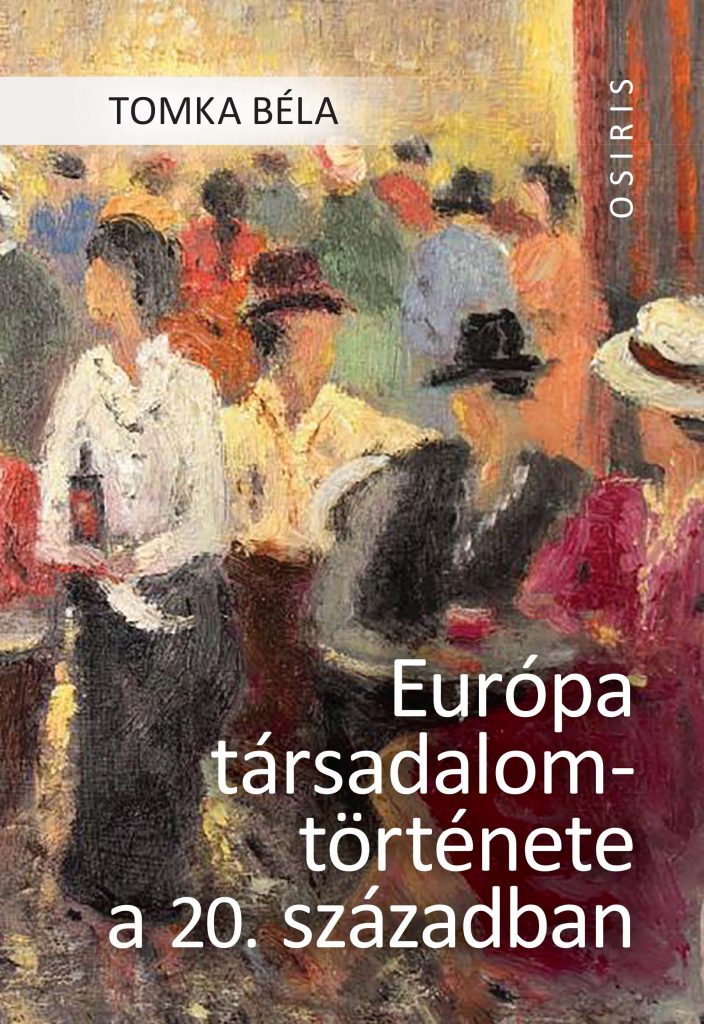
Európa társadalomtörténete a 20. században [A Social History of 20th Century Europe], Fully revised second edition, Budapest: Osiris Kiadó, 2020, 664 pp.
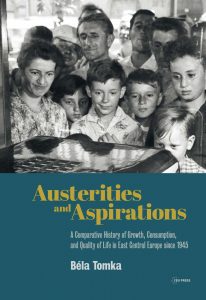
Austerities and Aspirations: A Comparative History of Growth, Consumption and Quality of Life in East Central Europe since 1945, Budapest and New York: Central European University Press, 2020, 445 pp.
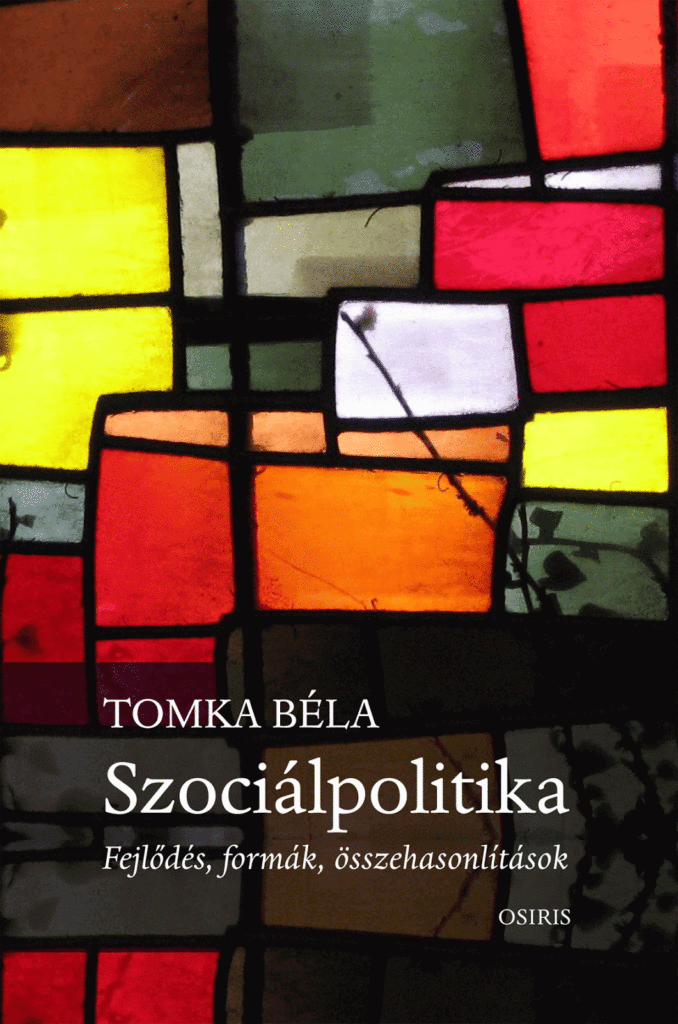
Szociálpolitika: Fejlődés, formák, összehasonlítások [Social Policy: Historical Trends, Forms, and Comparisons], Budapest: Osiris, 2015, 250 pp.
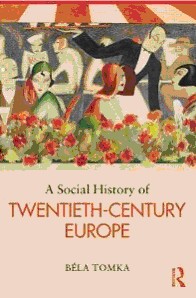
A Social History of Twentieth-Century Europe, London and New York: Routledge, 2013, 552 pp.(***Winner of “Outstanding Academic Title 2013 Award” from CHOICE, American Library Association***)

Gazdasági növekedés, fogyasztás és életminőség: Magyarország nemzetközi összehasonlításban 1918-tól napjainkig [Economic Growth, Consumption and Quality of Life: Hungary in an International Comparison, 1918 to Present], Budapest: Akadémiai Kiadó, 2011, 306 pp.
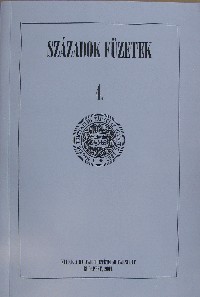
Trendek, típusok, teljesítmények: jóléti államok a 20. században [Trends, Types and Achievements: Welfare States in the 20th Century], Budapest: Magyar Történelmi Társulat – Századok, 2009, 85 pp.
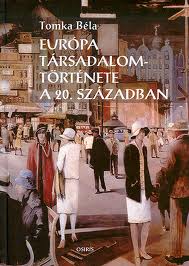
Európa társadalomtörténete a 20. században [A Social History of 20th Century Europe], Budapest: Osiris Kiadó, 2008, 648 pp.
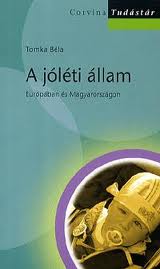
A jóléti állam Európában és Magyarországon [The Welfare State in Europe and Hungary], Budapest: Corvina Kiadó, 2008, 120 pp. Download
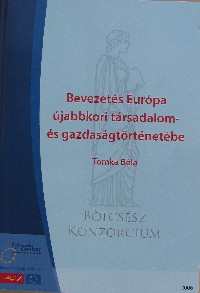
Bevezetés Európa újabb kori társadalom- és gazdaságtörténetébe [Economic and Social History of Modern and Contemporary Europe: An Introduction], Budapest: HEFOP, 2006, 182 pp.
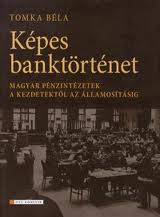
Képes banktörténet. Magyar pénzintézetek a kezdetektől az államosításig [An Illustrated History of Hungarian Banks: From the Beginnings to the Nationalization], Budapest: HVG Kiadó, 2006, 168 pp.

Welfare in East and West: Hungarian Social Security in an International Comparison, 1918–1990, Berlin: Akademie Verlag, 2004, 192 pp. Download
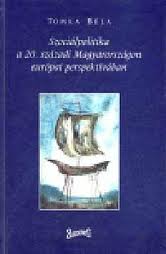
Szociálpolitika a 20. századi Magyarországon európai perspektívában [Social Policy in 20th Century Hungary in a European Perspective], Budapest: Századvég, 2003, 217 pp. Download

Családfejlődés a 20. századi Magyarországon és Nyugat-Európában: konvergencia vagy divergencia? [Family Development in Hungary and Western Europe in the 20th Century: Convergence or Divergence?], Budapest: Osiris, 2000, 152 pp. Download

Érdek és érdektelenség: a bank–ipar viszony a századforduló Magyarországán, 1892–1913 [Interest and Disinterest: Bank–Industry Relations in Hungary at the Turn of the Century, 1892–1913], Debrecen: Debrecen University Press, 1999, 246 pp. Download

A Harmadik Birodalom. A kutatás új útjai [The Third Reich. New Directions of Research], Szeged: Jate Press, 1998, 120 pp. Download
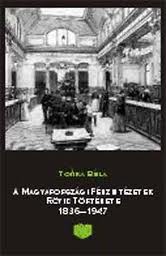
A magyarországi pénzintézetek rövid története, 1836–1947 [A Short History of Hungarian Banking, 1836–1947], Budapest: Gondolat, 1996, 132 pp. (Second edition: Budapest: Aula, 2000, 184 pp.) Download
Edited volumes
(Co-edited by László Szarka) Nationalisms in Action: East Central Europe in the Great War (forthcoming, New York: Berghahn Books, 2021, ca. 380 pp.)
Intézményi és kulturális transzferek a 20. századi Magyarországon [Institutional and Cultural Transfers in 20th-century Hungary], Aetas, vol. 34 (2019), no. 4, 186 pp. Download
Rendszerváltozások Magyarországon és Kelet-Közép-Európában [Regime Changes in Hungary and East Central Europe], Aetas, vol. 28 (2013), no. 4, 218 pp. Download
Rendszerváltozás és történetírás – Korok és korszakolás a történetírásban [Periodization in History], Aetas, vol. 25 (2010), no. 4, 194 pp. Download
(Co-editors: Károly Halmos, Judit Klement and Ágnes Pogány) A felhalmozás míve. Tanulmányok Kövér György tiszteletére [The Art of Accumulation: Studies Honouring György Kövér], Budapest: Századvég Kiadó, 2009, 540 pp.
Magyarország 19–20. századi gazdaság- és társadalomtörténete [Social and Economic History of Hungary in the 19th and 20th Century], Aetas, vol. 19 (2004), no. 1, 190 pp. Download
Összehasonlító történetírás [Comparative History], Aetas, vol. 15 (2000), no. 4, 196 pp. Download
A Habsburg Birodalom a 19. században [The Habsburg Monarchy in the 19th Century], Aetas, vol. 12 (1997), no. 4, 226 pp. Download
Összehasonlító gazdaság- és társadalomtörténet. [Comparative Economic and Social History of Modern Hungary], Aetas, vol. 9 (1994), no. 3, 187 pp. Download
Historiográfia – Körkérdés a magyar történetírás szerkezetéről [Historiography – The Structure of History Writing in Hungary], Aetas, vol. 8 (1993), no. 4, 252 pp. Download
Banktörténet a 19–20. századi Magyarországon [Banking in 19th and 20th Century Hungary], Aetas, vol. 7 (1992), no. 3, 164 pp. Download
Selected articles and contributions to edited volumes
“Lebensstandard und Konsum im 19. und 20. Jahrhundert” (forthcoming in Ulf Brunnbauer, ed., Handbuch zur Geschichte Südosteuropas, Band 6: Wirtschaft und Gesellschaft in Südosteuropa von 1800 bis zur Gegenwart, 2021, ca. 25 pp.)
“Consumption and Leisure in 20th Century Central and Eastern Europe”, in Wlodzimierz Borodziej, Stanislav Holubec and Joachim von Puttkamer, eds., The Routledge History Handbook of Central and Eastern Europe in the Twentieth Century, vol. 1, London and New York: Routledge, 2020, 385–443.
(Co-authored by Stanislav Holubec) “Population and Family in 20th Century Central and Eastern Europe”, in Wlodzimierz Borodziej, Stanislav Holubec and Joachim von Puttkamer, eds., The Routledge History Handbook of Central and Eastern Europe in the Twentieth Century, vol. 1, London and New York: Routledge, 2020, 235–312.
“Fogyasztás a második világháború utáni Kelet-Közép-Európában: politikai meghatározók és transznacionális hatások” [Consumption in Post-war East Central Europe: Political Determinants and Transnational Connections], Aetas, vol. 34 (2019), no. 4, 62–74.
“Az első világháború és a trianoni béke gazdasági hatásai Magyarországon” [The Economic Effects of WWI and the Trianon Treaty in Hungary], in Zsombor Bódy (ed.): Háborúból békébe: a magyar társadalom 1918 után. Konfliktusok, kihívások, változások a háború és az összeomlás nyomán. Budapest: MTA Bölcsészettudományi Kutatóközpont Történettudományi Intézet, 2018, 47–80.
“Erőszak a történelemben: jelentések és hosszú távú trendek” [Violence in History: Meanings and Long-Term Trends], Aetas, vol. 33 (2018), no. 3, 170–185.
“Az EU és a nemzetállamok viszonyáról: Válasz Schöpflin Györgynek” [The EU and the nation states: A Reply to György Schöpflin], Kommentár, vol. 13 (2018), no. 1, 83–88.
“A Horthy-rendszer mérlege vagy vádirata?” [A Balance Sheet or Indictment of the Horthy-regime?], Múltunk, vol. 63 (2018), no. 1, 1–15.
“Társadalmi és politikai változások Európában, 1880–1914 [Social and Political Changes in Europe, 1880–1914], in Gábor Egry and Eszter Kaba, eds., 1916: A fordulat éve?, Budapest: Napvilág Kiadó, 2017, 27–46.
“Mítoszok az Európai Unió demokratikus hiányosságairól” [Myths about the Democratic Deficit of the European Union], Kommentár, vol. 11 (2016), no. 6, 20–28.
“Fordulatok és félfordulatok. Beszámoló a 22. Történész Világkongresszusról” [Whole Turns and Half Turns: The 22nd International Congress of Historical Sciences], Századok, vol. 150 (2016), no. 3, 811–816.
“Körkérdés 1945-ről” [The Significance of 1945 in European History], Levéltári Közlemények, vol. LXXXVI (2015), 337–339.
“A jelenkortörténet kutatása: kinek az eszköze?” [Contemporary History: To Whom Does It Belong?], in Gyöngy Kovács Kiss, ed., A történész műhelye, Cluj: Komp-Press Korunk, 2015, 227–242.
“Az első világháború mint történeti korszakhatár” [The First World War as an Historical Divide], in Béla Tomka, ed., Az első világháború következményei Magyarországon, Budapest: Osiris, 2015, 7–23.
“Demographic change, urbanisation and social movements during the industrial revolutions in Europe”, in Council of Europe, ed., Shared Histories, Strasbourg: Council of Europe, 2014, 57–62.
“Gazdasági rekonstrukció Magyarországon az első világháború után: Régi és új szempontok” [Economic Reconstruction in Hungary after the First World War: Old and New Approaches], in Zsejke Nagy, ed., Gróf Bethlen István és kora, Budapest: Osiris, 2014, 75–95.
“Social History as a Discipline: Development, Themes and Methods” in UNESCO-EOLSS Joint Committee, eds., Historical Developments and Theoretical Approaches in Sociology, Oxford: EOLSS Publishers, 2013, 1–15. Download
“Szociálpolitika Magyarországon a világháborúk korában” [Social Policy in Hungary in the Age of World Wars] Korunk, vol. XXIII (2012), no. 11, 46–55. Download
“Szociálpolitika Magyarországon a Kádár-rendszer időszakában: intézmények, funkciók és szakaszok” [Social Policy in Hungary in the Kádár-Era: Institutions, Functions and Periods] Múltunk, vol. LVII (2012), no. 2, 27–49. Download
“European integration and social policy from an East Central European perspective”, in Arnd Bauerkämper and Hartmut Kaelble, Hrsg., Gesellschaften in der europäischen Integration seit den 1950er Jahren. Migration – Konsum – Sozialpolitik – Repräsentationen, Stuttgart: Franz Steiner Verlag, 2012, 123–132. Download
“Gazdasági változások és a fogyasztás alakulása a huszadik századi Magyarországon” [Economic Changes and Consumption in 20th Century Hungary], in Gyöngy Kovács Kiss and Ignác Romsics, eds., A mi 20. századunk, Cluj–Kolozsvár: Komp-Press Kiadó–Korunk, 2011, 101–179. Download
“A ‘befejezetlen 20. század’ és a ‘csonka 20. század’. A jelenkori európai és magyar történelem periodizációjáról” [The ‘Unfinished 20th Century’ and the ‘Broken 20th Century’: On the Periodization of Contemporary European and Hungarian History], Aetas, vol. 25 (2010), no. 4, 97–106. Download
“Ökumené vagy globális közösség? Beszámoló a 21. Történész Világkongresszusról” [Oecumene or Global Community of Historians?], Századok, vol. 144 (2010), no. 6, 1553–1558. Download
“Életminőség és történelem” [Quality of Life and History], in Zsombor Bódy, Sándor Horváth and Tibor Valuch, eds., Megtalálható-e a múlt? Tanulmányok Gyáni Gábor 60. születésnapjára, Budapest: Argumentum, 2010, 245–255.
“Gazdasági növekedés és fogyasztás Magyarországon a 20. században” [Economic Growth and Consumption in 20th Century Hungary], Korunk, vol. XXI (2010), no. 4, 30–45.
“Social Policy in East Central Europe: Major Trends in the 20th Century” (Co-author: Dorottya Szikra), in Alfio Cerami and Peter Vanhuysee, eds., Post-Communist Welfare Pathways: Theorizing Social Policy Transformations in Central and Eastern Europe, Basingstoke: Palgrave Macmillan, 2009, 17–34. Download
“Social Security in Postwar East Central Europe”, in Alice Kessler-Harris and Maurizio Vaudagna, eds., Democracy and Social Rights in the “Two Wests”. Torino: Otto Editore, 2009, 307–328. Download
“A ‘hatvanas évek’ Magyarországon: összehasonlítások tanulságai” [The ‘Sixties’ in Hungary: Lessons from Comparisons], in Károly Halmos, Judit Klement, Ágnes Pogány and Béla Tomka, eds., Tanulmányok Kövér György hatvanadik születésnapjára, Budapest: Századvég Kiadó, 2009, 552–560. Download
“A jóléti államok az ezredfordulón: válságjelek vagy válságmítoszok?” [The Welfare States at the Turn of the Century: Crises or Crises Myths?], Magyar Tudomány, vol. 170 (2009) no. 2, 197–208. Download
“Az időskor mint elkülönült életszakasz kialakulása: a nyugdíjrendszerek szerepe” [The Old Age as a Differentiated Stage of Life: The Role of Pension Sytems], in Gábor Gyáni and Magdolna Láczay, eds., Generációk a történelemben, Nyíregyháza: Hajnal István Kör, 2008, 39–50. Download
“Intézményesült változékonyság: a jóléti fejlődés sajátos meghatározói Kelet-Közép-Európában” [Institutionalized Volatility: The Peculiar Determinants of Welfare Development in East Central Europe], Korall, vol. 28–29 (2007), 146–166. Download
“Social Solidarity in East Central Europe: Strong Welfare and Weak Labour?” in Bo Strath and Lars Magnusson, eds., European Solidarities: Tensions and Contentions of a Concept, Brussels: Peter Lang, 2007, 171–192. Download
“Perfecting Institutionalization: The Foundation of the International Social History Association”, Journal of Social History, vol. 42 (2007), no. 2, 987–989. Download
“The Politics of Institutionalized Volatility: Lessons from East Central European Welfare Reforms”, in Tomasz Inglot, ed., Fighting Poverty and Reforming Social Security: What Can Post-Soviet States Learn from New Democracies in Central Europe? Washington, DC.: Woodrow Wilson Center, 2007, 67–85. Download
“Rászorultsági elv vagy általános szociális jogok? Jóléti rendszerek történeti és összehasonlító kutatásának tanulságai” [Selectivity or universal social rights? Lessons of comparative welfare state research], Esély, vol. 17 (2006), no. 5, 20–42. Download
“East Central Europe and the European Social Policy Model: A Long-Term View”, East European Quarterly, vol. 40 (2006), no. 2, 135–159. Download
“Social and Economic Convergences in 20th Century Europe”, in Josefina Cuesta Bustillo, ed., Del espacio social europeo a la Europa Social, Salamanca: Univesidad de Salamanca, 2005.
“Globalizáció és fragmentáció között. Beszámoló a Történész Világkongresszusról” [Between Globalization and Fragmentation. On the 20th International Congress of Historical Sciences in Sydney], Századok, vol. 139 (2005), no. 6, 1558–1563. Download
“A társadalomtörténet-írás nemzetközi intézményesülésének állomásai. A Nemzetközi Társadalomtörténeti Társaság létrejöttéről” [The Institutionalization of International Social History. The Foundation of the International Social History Association], Századok, vol. 139 (2005), no. 6, 1563–1566. Download
“Determinants of East Central European Welfare Systems”, in Martyn Lyons, ed., History in Global Perspective: Proceedings of the 20th International Congress of Historical Sciences , Sydney: University of New South Wales, 2005.
“Az összehasonlító módszer a történetírásban – eredmények és kihasználatlan lehetőségek” [The Comparative Method in the Historical Sciences: Results and Unexploited Possibilities], Aetas, vol. 20. (2005), no. 1–2, 243–258.
“Az Európai Szociális Modell múltja és jelene – kelet-közép-európai perspektívák” [The Past and Present of the European Social Model: East Central European Perspectives], Esély, vol. 15 (2004), no. 5, 32–53. Download
“Wohlfahrtsstaatliche Entwicklung in Ostmitteleuropa und das europäische Sozialmodell 1945–1990”, in Hartmut Kaelble und Günter Schmid (Hrsg.), Das Europäische Sozialmodell: Auf dem Weg zum transnationalen Sozialstaat (Wissenschaftszentrum zu Berlin, Jahrbuch 2004), Berlin: Sigma Verlag, 2004, 107–139. Download
“Az összehasonlító történetírásról. Tanulságok a magyar történetírás számára” [On Comparative History: Lessons for the History Writing in Hungary], Magyar Tudomány, vol. IL (2004), no. 7, 732–742. Download
“Társadalomtörténeti hagyományok, irányzatok, módszerek – a nemzetközi gyakorlat szemszögéből” [Traditions, Approaches and Methods in Social History: Some Lessons from the International Research], Korall, vol. 15 (2004), 341–348.
“Western European Welfare States in the 20th Century: Convergences and Divergences in a Long-Run Perspective”, International Journal of Social Welfare, vol. 12 (2003), no. 4, 249–260. Download
“A jóléti kiadások alakulása Magyarországon nemzetközi összehasonlításban, 1918–1990” [Welfare expenditures in Hungary in international comparison, 1918–1990], Statisztikai Szemle, vol. 81 (2003), no. 1, 52–69. Download
“Demographic Diversity and Convergence in Europe, 1918–1990: The Hungarian Case”, Demographic Research, vol. 6 (2002), no. 2, 19–48. Download
“Social security in Hungary in a long-run and comparative perspective: expenditures, social rights, and organization, 1918–1990”, Arbeitspapiere des Osteuropa-Instituts der Freien Universitaet Berlin. Arbeitsbereich Politik und Gesellschaft. Nr. 43, 2002, 45 pp. Download
“A jóléti intézmények fejlődésének meghatározói a XX. századi Európában. A hosszú távú összehasonlítások néhány tanulsága” [Determinants of welfare development in 20th century Europe: some lessons of long-run comparisons], Valóság, vol. 45 (2002), no. 6, 83–94.
“A jóléti rendszerek a 20. századi Magyarországon: Nemzetközi összehasonlítás” [The welfare systems in 20th century Hungary: An international comparison], Történelmi Szemle, vol. 43 (2001), no. 3–4, 209–236. Download
“Social Integration in 20th Century Europe: Evidences from Hungarian Family Development”, Journal of Social History, vol. 35 (2001), no. 2, 327–348. Download
“The Development of Hungarian Banking: An International Comparison, 1880–1931”, Journal of European Economic History, vol. 30 (2001), no. 1, 125–162. Download
“A német tőke Magyarországon az első világháború előtti évtizedekben” [German capital investment in Hungary before WWI], Századok, vol. 135 (2001), 1053–1073. Download
“Financial Institutions in Hungary in Central-European Comparison, 1873–1931”, Nordic Notes (Special Edition: Oslo 2000), vol. 5 (2001), 1–33.
“Interlocking Directorates Between Banks and Industrial Companies in Hungary at the Beginning of the Twentieth Century”, Business History, vol. 43 (2001), no. 1, 25–42. Download
“Társadalmi integráció a 20. századi Európában: Magyarország esete” [Social Integration in Europe in the 20th Century: The Case of Hungary], Századvég, vol. 17 (2000), 3–40.
“A magyar bankrendszer fejlődésének sajátosságai nemzetközi összehasonlításban, 1880–1931” [The Development of the Hungarian Banking Structure in a Comparative Perspective, 1880–1931] Századok, vol. 133 (1999), no. 3, 655–683. Download
“Das Verhältnis zwischen Banken und Industrie in Ungarn, 1895–1913” Ungarn–Jahrbuch (München), vol. 23 (1997), 173–203. Download
“Személyi összefonódás bankok és iparvállalatok között a századforduló Magyarországán” [Interlocking Directorates in Hungary at the Turn of the Century] Replika, vol. 25 (1997), no. 1, 37–46. Download
“Bankuralom, bankérdekeltség, bankellenőrzés: A magyarországi pénzintézetek ipari kapcsolatai a századfordulón, 1895–1913” [Bank Hegemony, Bank Interests and Bank Control: Industrial Relations of Banks in Hungary, 1895–1913] Történelmi Szemle, vol. XXXVII (1995), no. 2, 171–207. Download
“A totalitarizmuselméletektől az »Új társadalomtörténet«-ig. Változó hangsúlyok a Harmadik Birodalom értelmezésében” [From the Totalitarianism-Theories to the »New Social History«: Changing Interpretations of the Third Reich] Aetas, vol. 7 (1993), no. 4, 92–112.
“A Hitler-jelenség és a Harmadik Birodalom uralmi rendszere” [Hitler and the Power Structure of the Third Reich] Századok, vol. 127 (1993), no. 2, 312–331. Download
“A bank–ipar kapcsolat Németországban 1850 és 1913 között” [Bank–Industry Relations in Germany between 1850 and 1913] Századok, vol. 127 (1993), no. 1, 127–142. Download
“Történészviták a Harmadik Birodalom gazdaságáról” [Debates on the Economy of the Third Reich] Világtörténet, vol. 14 (1992), no. 1–2, 33–43.
“Vita a weimari köztársaság bukásának gazdasági okairól” [Debates on the Economy of Nazi Germany] Világtörténet, vol. 9 (1987), no. 4, 110–130. Download
Work in progress
The Manuscript of a book (ca. 200 pages) with the working title “Comparative, Transnational and Global History”
For a full list of publications, see Hungarian Bibliography of Scholarly Works (MTMT)


